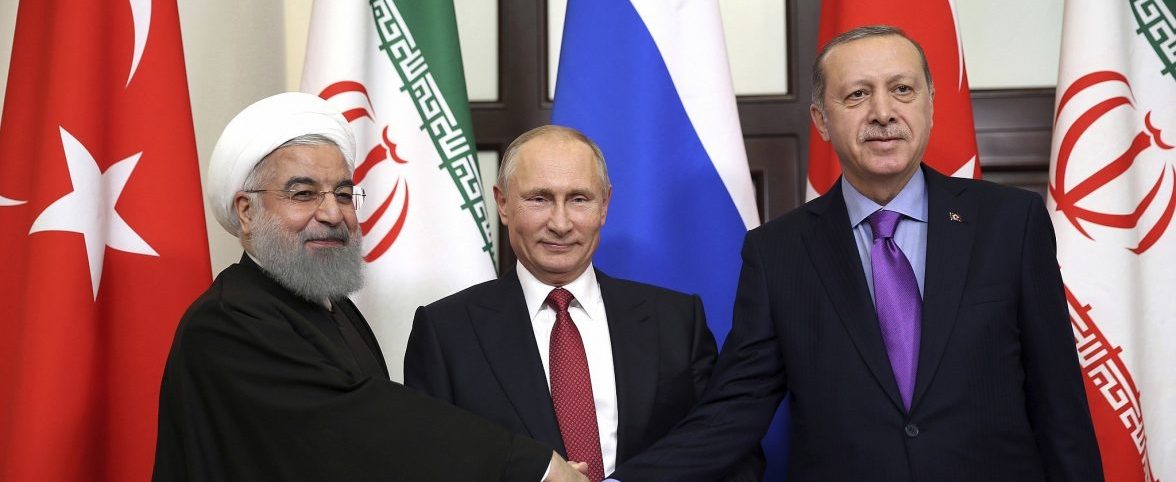Yet another trilateral Russia-Iran-Turkey summit on Syria was held in Sochi on 14 February. It did not produce any breakthroughs or surprises, but merely confirmed existing difficulties, challenges and risks.
Prior to the summit, three major events occurred that heavily influenced the agenda.
First was the dysfunctional Russia-Turkey agreement on an Idlib buffer zone, reached in September, which has not improved matters in the Syrian province. Quite the opposite: Idlib has been taken over by the al-Qaeda-linked fighters of Hayat Tahrir al-Sham (HTS), subjugating moderate opposition groups. This has undermined the deal, increasing the risk of friction between Moscow and Ankara.
Impeding the political process
Second was the US decision, announced in December, to withdraw its forces from Syria, adding another layer of complexity to the conflict and leaving Russia, Turkey and Iran uncertain about the fate of the Kurds and territories east of the Euphrates. Whether or how the US follows through on the withdrawal goal remains to be seen.
The third event was the inability of the three countries to agree on the composition of a constitutional committee, which is now seen as the major obstacle holding up the Syrian political process.
With regards to the situation in Idlib, the Sochi summit added no clarity. Russia continues to push for all of Syria to be brought back under the control of Damascus, making it harder for Turkey to negotiate.
In recent months, Syrian opposition groups in Idlib, such as the Turkey-backed National Liberation Front, have become weaker, allowing HTS to gain control over the province. Other armed factions – Ahrar al-Sham, Suqur al-Sham, Nureddine al-Zinki – have also been defeated by HTS and either been absorbed by it or relocated to northeastern areas of Aleppo province controlled by Turkey.
As a result, the Russia-Turkey Idlib deal, which envisaged Ankara using its proxies to rein in jihadists, has not been respected. Although Moscow insists that it remains committed to agreement, it simultaneously argues that the deal cannot be implemented because the terrorist threat has reached an “alarming level”.
Idlib offensive
In a recent interview, Russian government spokesman Dmitry Peskov clarified certain details about the Russia-Turkey talks on Idlib. He said that while a military operation is needed, it is not yet clear who will conduct it – Turkey or “some other countries”. To make the Idlib deal work, he said, there should be no attacks on Russia’s Khmeimim military base, Aleppo or the Syrian army.
As such, it appears to be just a matter of time as to when the Idlib offensive will happen, the result of which would bring the province back under Syrian government control.
Meanwhile, after the US announcement to withdraw its forces from Syria, Turkey has a higher-priority area on which to concentrate its efforts: Kurdish-held territory east of the Euphrates and along the Turkey-Syria border.
Idlib was never a top priority for Ankara, holding more risk of potential tensions with Russia and requiring additional military efforts to confront terrorists. This made it easy for Turkey to switch to its main priority – Kurdish issue and northeastern Kurdish-held areas. This goes hand-in-hand with another of Ankara’s major goals: to resettle Syrian refugees (Turkey hosts more than 3.5 million Syrians) in their country’s Turkey-controlled safe-zone.
It remains unclear, however, what moves Turkey will make east of the Euphrates. US forces are still in place, and Washington has indicated it will not leave the Kurds without security and Iran unchecked. It is evident that all parties involved need to reach a deal on Kurdish-held areas, but how that deal will look is anyone’s guess. This remains one of the most challenging tasks for all involved.
Heightened tensions
Against this backdrop, Moscow has pointed to the potentially significant role of the 1998 Adana agreement signed by Syria and Turkey, which deals with security concerns over Kurdish fighters. Although Russia generally supports Turkey’s proposal to set up a 32-kilometre safe zone in northern Syria, it insists that Damascus should be involved in the discussions and implementation, a notion Ankara has rejected.
Although Ankara, Moscow and Tehran have treated US President Donald Trump’s decision to pull out of Syria positively, they remain sceptical about how it will play out. This unpredictability affects many key issues in Syria, from the Kurdish question to the fate of territories east of Euphrates, to Iran’s influence in the country.
As for the constitutional committee and the political process in general, no breakthroughs emerged in Sochi. Damascus and Syrian opposition groups are not reluctant to compromise, but the opposition has long suffered from fragmentation, a problem that has been heightened due to ongoing tensions between Turkey and Saudi Arabia, two major backers of Syrian rebel groups.
Turkey-Saudi relations have hit a rough patch, particularly after the death of US-based Saudi journalist Jamal Khashoggi at the Saudi consulate in Istanbul last year. In addition to that, the US withdrawal announcement primarily benefits Ankara, which can move to consolidate its influence in Syria’s northeast – a concerning development for Riyadh.
Gulf influence
Both Saudi Arabia and the United Arab Emirates want to be able to keep both Iran and Turkey in check in Syria. Recent developments, including the reopening of the UAE’s embassy in Damascus, the Syria-UAE business forum in Abu-Dhabi and the visit of Syrian President Bashar al-Assad’s chief security adviser to Riyadh late last year, have underscored the desire of Gulf powers to secure their interests and influence in Syria.
This could ultimately have a negative impact on the Syrian political process. The Gulf states and Turkey support different groups among the Syrian opposition, which may lead to deepening disagreements among the opposition and contribute to their inability to devise a united position.
At the same time, a question mark hangs over the US role in Syria and how it will implement its decision to pull out of the country. This will have a significant impact on the other major issues facing Syria, from Idlib, to the Kurds, to the future role of Tehran.
Original publication middleeasteye.net












